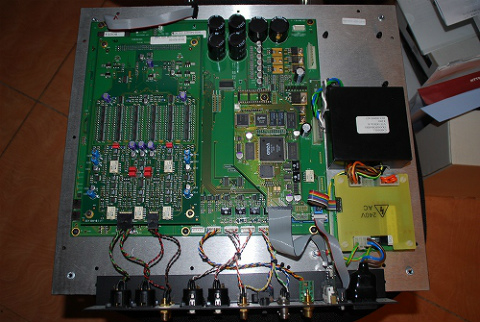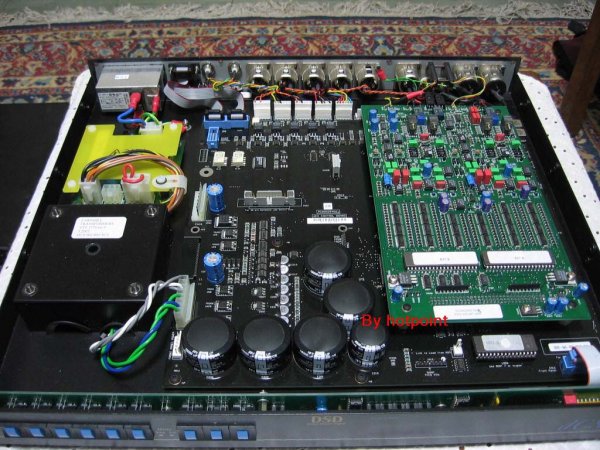This is the only info dCS has released so far:
Making the Network Bridge
In the first instalment of this four-part feature, Chris Hales, dCS Director of Product Development, gives his take on the new Network Box…
“This is for people who bought into pre Vivaldi, to give them access to network streaming of audio. Scarlatti, Paganini or even classic Elgar owners don’t have access to this – unlike the new Rossini – and it's increasingly becoming the way that people are consuming music”, explains Chris Hales. “This special product really came out of that need. In essence it's using the network hardware that we have in Rossini and Vivaldi, all the IP and know-how that we built up over the period that we have been developing that. It receives audio via UPnP, Apple Airplay, Spotify Connect, TIDAL and other sources and outputs bit perfect au-dio in a form that a legacy dCS DAC can use, and that’s really what we are try-ing to achieve.”
Chris says that it was a case of using the tried and tested dCS streaming plat-form and adapting it for this special box of tricks. “As far as the network hard-ware design is concerned, our platform is now well developed, although need-less to say some customisation was needed.” As with the new Rossini, the net-work hardware itself is supplied by Stream Unlimited in Vienna. “The Rossini uses a Stream 800 board which is a very capable network solution, and the Network Box is using a variant of that – the Stream 820. This is essentially the same board, but with a slightly more powerful processor, plus it’s wi-fi enabled. We really wanted to take advantage of this feature.”
He says that dCS always recommends a wired connection for the best sound, “…if you possibly can. This is because you are guaranteed bandwidth which you are absolutely not with a wireless connection. But some users although they stream all their music files, may enjoy the added flexibility of wi-fi.
“The board itself is self contained and is not modified,” explains Chris, “as de-livered by Stream Unlimited. But needless to say, it requires power supplies and is flexible in its own right. So one of the key things that we have done is to alter the clocking. So the Stream board plugs into a motherboard that has some typi-cal dCS circuitry on it that basically gives you all the benefits of our clocking system that you'd have in any other dCS product. The very high quality clock-ing gives low jitter, and of course it has our usual power supply arrangements. Traditionally we don't make too much fuss about dCS power supplies because it’s something that’s just got to be done right, but perhaps that’s dCS modesty – you need to do things well if you want things to work right. But the Network Box power supplies are typologically similar to what you would find on a dCS control board, with ultra low noise…”
In terms of connectivity, Chris says dCS, “is trying not to be too partisan”, so it could be used with both dCS and a very wide range of other manufacturers’ products too. “But the general idea is that if you have a dCS product, be it the very early Elgar or the most recent Scarlatti, you will be able to use this box to maximum effect. So we have processing options which will allow you to downsample to whatever the maximum sample rate your DAC can cope with, or not as you wish. The idea is to make the box as transparent as we possibly can where we can, and then to process minimally to suit your DAC where that's appropriate.”
“The motherboard has a big Field Programmable Gate Array (FPGA) on there as you’d expect from a dCS product, which does all the processing and all the logic and so forth. It’s not quite the monster that we have inside the Rossini but nevertheless we've got a lot of processing in there that can interface with the Stream 800 board and take that and send it out onto the digital output and so forth. So the processing platform is typically flexible and upgradable, as ever with dCS. All the software is done in-house as usual, from our algorithms to the control coding. What we have inside is by no means a generic Stream 820 by the way – there are lots of features which didn't exist before we commissioned them to build those in. We had a lot of dialogue with Stream Unlimited to shape the architecture of this board and to integrate these new features into our pack-age. I think many of the performance features wouldn't have been developed, if we weren't the lead customer on those…”
Overall, Chris says the new Network Box is an interesting niche product that will expand the horizons of both dCS fans and the wider audiophile public alike. “It’s a product for the legacy market, but with very much the quality of that processing that you would expect from dCS.”
It has been posted on their FB page:
https://www.facebook.com/dCSonlythemusic/?fref=ts
Thanks! Not a word on DSD, unfortunately…
Greetings from Switzerland, David.



